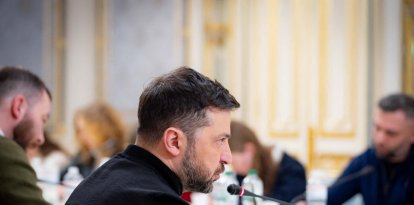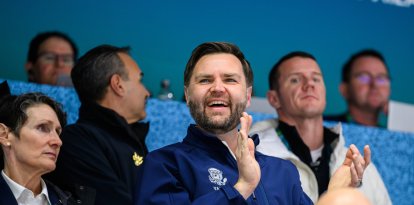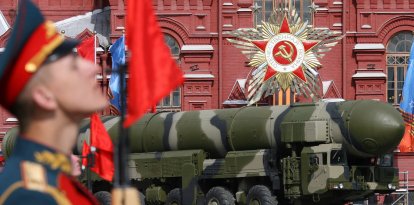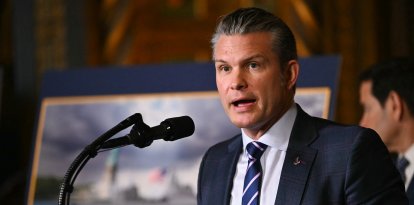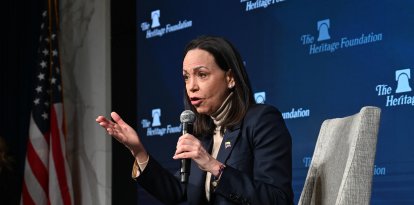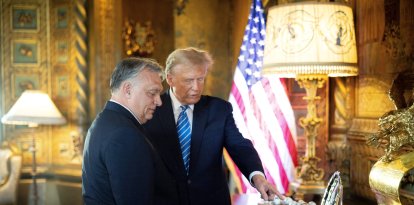U.S.-Russia summit: peace agreement for Ukraine must be 'acceptable' to all sides
Ahead of the talks, Russian President Vladimir Putin acknowledged that Kiev had "the right" to join the European Union but not NATO. Both Europe and Ukraine protested their exclusion from the meeting.

Russian and U.S. delegations
Senior U.S. and Russian officials met Tuesday in Riyadh, Saudi Arabia. The first high-level meeting since Russia invaded Ukraine nearly three years ago came a week after a telephone conversation between Donald Trump and his Russian counterpart, Vladimir Putin.
Putin said Tuesday he was "ready" to negotiate with Ukrainian leader Volodymyr Zelensky. He also recognized Ukraine's "right" to join the European Union, although he rejected its demand to join the North Atlantic Treaty Organization (NATO). Hours before the meeting, Russia sent a sign of goodwill by releasing U.S. prisoner Kalob Byers.
The U.S. delegation is headed by Secretary of State Marco Rubio, National Security Advisor Mike Waltz and Special Envoy for the Middle East Steve Witkoff. On the Russian side are Sergey Lavrov, head of diplomacy, and Kremlin Yuri Ushakov, diplomatic advisor.
This is how we told you about the Russia-US summit in Riyadh.
Times are in Eastern Time (ET)
Peace agreement for Ukraine must be 'acceptable' to all sides
At the press conference held at the end of the meeting, Marco Rubio insisted that success for peace in Ukraine will lie largely in the agreement being “acceptable” to all parties involved in the conflict.
He thus refers to the assumptions accusing Washington of holding a dialogue with Russia without taking Ukraine or the European Union into account. “I think the key in all of this is ultimately going to be whether an agreement can be reached with all parties involved on an acceptable resolution of the conflict in Ukraine,” Rubio said.
Marco Rubio says he is satisfied with the meeting with Russia
Secretary of State Marco Rubio and the rest of the delegation that traveled to Riyadh said they were satisfied with the meeting they had with the Russian emissaries. The delegation held a brief press conference after the meeting.
The heads of the U.S. and Russian diplomacy agreed at the end of their meeting on Tuesday in Riyadh to “lay the groundwork for future cooperation” between their countries, estranged since Russia's invasion of Ukraine in 2022, the State Department said.
Marco Rubio and Sergey Lavrov agreed to “lay the groundwork for future cooperation on geopolitical issues of common interest and on the economic and investment opportunities that will arise from a resolution of the conflict in Ukraine,” U.S. diplomacy spokeswoman Tammy Bruce said in a statement on the content of the meeting.
US: We agreed to 'address irritants to our bilateral relationship'
Tammy Bruce, spokesperson for the State Department, declared after the end of the meeting that both countries had agreed "address irritants to our bilateral relationship with the objective of taking steps necessary to normalize the operation of our respective diplomatic missions."
Furthermore, in a statement first picked up by The Guardian, Bruce assured that the delegations agreed to appoint teams to continue talks around the war in Ukraine.
"President Trump wants to stop the killing; the United States wants peace and is using its strength in the world to bring countries together," the spokeswoman said. "President Trump is the only leader in the world who can get Ukraine and Russia to agree to that."
She also assured that Washington and Moscow will discuss "economic and investment opportunities" and "matters of mutual geopolitical interest."
First reactions from the Russian team: 'A serious conversation on all issuess'
Russian Kremlin diplomatic adviser Yuri Ushakov said the meeting had gone "well." "It was a serious conversation on all issues," he commented to Russian media.
Ushakov also said that a date for a possible meeting between Trump and Putin had not yet been arranged, but that it was unlikely to take place next week.
'China hopes that all parties and stakeholders can participate in the peace talks process'
Chinese Foreign Ministry spokesman Guo Jiakun maintained that the Chinese regime welcomed "all peace efforts to resolve the Ukraine crisis," including Tuesday's talks.
Although he added, alluding to Kiev's absence from the talks, "China hopes that all parties and stakeholders can participate in the peace talks process in due course."
"China always believes that dialogue and negotiation are the only viable way to resolve the crisis and has been committed to promoting talks for peace," Guo also said at a regular news briefing picked up by the official Xinhua media.
Russia lashes out at 'Euro-Atlantic hawks'
"Russia-US contacts at the highest and high levels are causing nervousness among the Euro-Atlantic Russia hawks," argued Maria Zakharova, Russian spokeswoman for the Foreign Ministry.
"As much as they try to prolong the Kiev junta’s agony, they will not succeed. Sooner or later, it will be held accountable," she added.
Those words were shared by the ministry's official X account along with pictures of the meeting, in which the two delegations can be seen seated at the table.
Zelenski in Ankara, with the view in Riyadh
President Volodimir Zelenski began his official activities in Ankara, Turkey, with an eye on what is happening thousands of kilometers away from the US-Russia summit. On Wednesday he himself will travel to Saudi Arabia.
Zelenski assured that he had not been officially informed of the meeting and warned that his country would disregard any agreement reached without Ukraine at the table.
The EU, ready to 'partner' with the White House
Ursula von der Leyen, president of the European Commission, the highest executive body of the European Union (EU), said Tuesday that the bloc of European countries wants to 'partner' with Washington to reach a "just and lasting peace" in Ukraine.
"Financially and militarily, Europe has brought more to the table than anyone else. And we will step up," she said after a meeting with Trump's special envoy on Ukraine, Keith Kellogg. "Now is a critical moment."
Von der Leyen's remarks come after EU leaders expressed concern about not being part of the talks in Riyadh. It also comes as internal divisions surface over a British initiative to deploy troops on Ukrainian territory as collateral in a peace process.
A day earlier several leaders of the group held an emergency meeting in Paris, France, to discuss their role in a possible pact and their efforts to increase defense spending, as demanded by Donald Trump.














